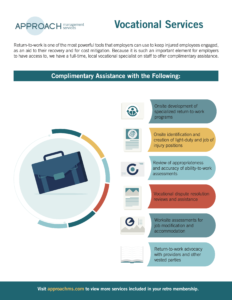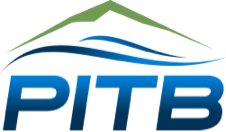
Welcome to the Ask Approach Service Spotlight. Throughout 2020, we’ve taken an in-depth look at a different services offered by Approach. For a quick look at all of the services available to Approach clients, download our Approach Services Infographic.
Find all of our Service Spotlight posts at https://www.pitb.com/category/ask-approach/service-spotlight/
Return to work, not school
If your employee is injured on the job, it’s up to you to make sure that they return either to their original job or to a light-duty position. If you can’t offer a suitable position for your employee, then it could be back to school for them and a big bill for your company! Approach helps your company avoid this situation with vocational services provided by our full-time, local, on-staff specialist.

Vocational retraining vs Vocational services
First off, let’s look at the difference between vocational retraining and vocational services:
- Vocational Retraining👎 : The expensive option, which involves sending an injured employee back to school for training in a new job or industry
- Vocational Services 👍 : Save money when Approach helps you to review work restrictions and design a job that fits the needs of your injured employee
In other words, Approach clients get access to vocational services at no extra charge, with the goal of reducing the chance that a claim will go to vocational retraining.

Why is Vocational Retraining bad?
Vocational Retraining is assigned when an employer can’t, or won’t, offer a job to their injured employee that is within their medical restrictions. The employee is entitled to return to gainful employment, so a process begins to determine what other type of job might be a fit for the employee. A Vocational Counselor is assigned to assess the employee’s work background and present capabilities, then recommend a potential career along with the training program needed to get the worker ready for this new job.
With so many steps, you can probably guess that vocational retraining isn’t usually successful. It can be good for the right type of worker, but often ends in disappointment if the worker has difficulty completing the training or finding new employment afterward.
Vocational retraining often ends in disappointment if the worker has difficulty completing the training or finding new employment.
Claims that go to Vocational Retraining are usually some of the most challenging and costly ones to manage. The main problem is that it comes late in the claims process, so a claim that’s been open for a year or more will probably stay open for at least two more years. By this point, many employers and injured employees are “over it” when it comes to the claim, just wishing it would be done. But, the claim continues to rack up time-loss and other expenses. Expensive claims with unmotivated stakeholders are a recipe for disaster when it comes to insurance rates and Retro refunds.
How vocational services can help your claim
As an Approach client, you have access to a range of vocational services through our on-staff specialist, who is focused on finding a pathway for your injured employee to return to work at your company. Bringing your employee back to work is ALWAYS the best possible outcome for workers’ comp claims, because it:
- Is the fastest path to claim closure
- Provides stability for your injured employee
- Makes your company eligible for return-to-work incentives from L&I
Our vocational specialist gets involved when there’s not a clear way back to work for your injured employee. You might disagree with a doctor’s assessment that the employee has a low ability to return to work. Or, you may be struggling to design a job or workstation that will accommodate the employee.
These are just a couple of reasons why you may need vocational services. In any case, our specialist will use a combination of specialized programs, job analysis, ability-to-work assessments, and worksite assessments to help secure clearance for return to work into a job that’s designed around the needs of your employee and company. When the outlook for a claim is challenging, vocational services can be invaluable in gaining a return to work that mitigates further claims costs.
Accessing vocational services
Your Approach retro coordinator will usually refer your claim to our vocational specialist when there’s an opportunity to improve the chances of return-to-work. You can also ask for a vocational review or help with a specific question – just ask your retro coordinator. Our vocational specialist is also a trained ergonomist, who can help with ergonomic issues or workstation design. Again, your retro coordinator will be happy to put you in touch.
